Supercharge Your Startup Journey
Launching a startup is tough. Need funding, mentorship, and the right connections? This listicle showcases eight of the best accelerators for startups to help you choose the perfect program for your venture. We'll cover top options like Y Combinator, Techstars, and 500 Global, exploring what each offers. Finding the right accelerator can fast-track your growth. Consider teaming up with a co-founder through IndieMerger to strengthen your application and long-term potential. Here are eight of the best accelerators for startups to consider in 2025.
1. Y Combinator
When discussing the best accelerators for startups, Y Combinator (YC) consistently tops the list. Founded in 2005, YC has earned a reputation as the world's premier startup accelerator, propelling thousands of companies to success. Its influence on the startup ecosystem is undeniable, having funded giants like Airbnb, Dropbox, Stripe, and Reddit. For startups seeking rapid growth and access to a powerful network, YC offers an unparalleled launchpad. This makes it a strong contender for businesses looking to scale quickly and connect with top-tier investors.
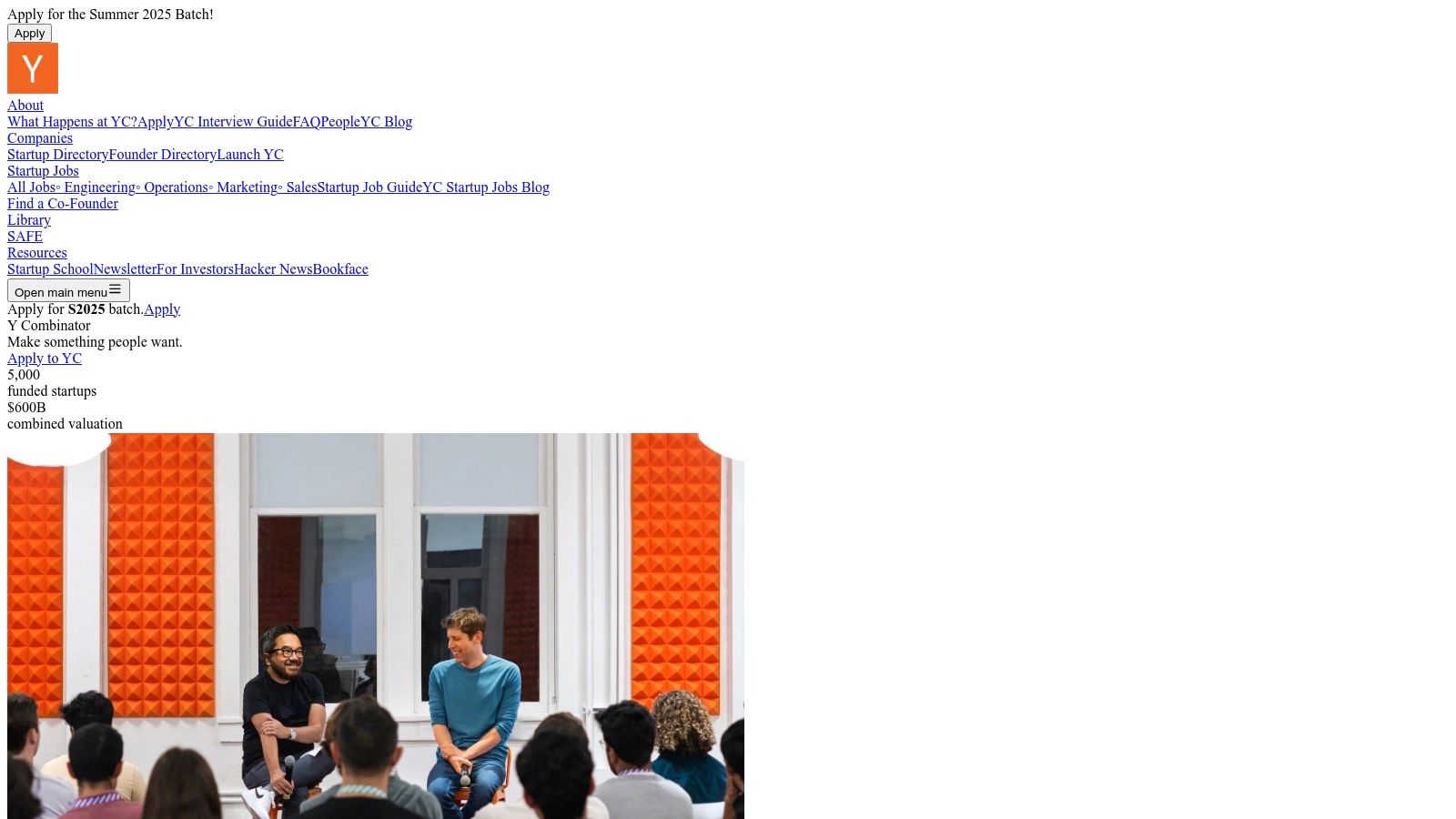
YC's three-month intensive program provides startups with much more than just funding. The program focuses on refining your product, achieving product-market fit, and preparing for rapid scaling. Participants receive $500,000 in funding: $125,000 for 7% equity and an additional $375,000 on an uncapped SAFE with Most Favored Nation (MFN) terms. This structure offers founders a significant financial boost while maintaining reasonable equity dilution. Beyond the investment, YC offers weekly dinners with partners, regular office hours for personalized mentorship, and access to a vast alumni network, fostering valuable connections and providing ongoing support. Specialized advice from domain experts and successful founders adds another layer of value, helping startups navigate industry-specific challenges. The program culminates in Demo Day, a highly anticipated event where startups pitch to a curated audience of top-tier investors, providing unparalleled exposure and fundraising opportunities. This is a critical advantage for early-stage companies seeking seed or Series A funding.
Features:
- $500,000 investment: $125,000 for 7% equity and $375,000 on an uncapped SAFE with MFN.
- Three-month intensive program: Weekly dinners and office hours with partners.
- Access to a large alumni network and investor connections: Leverage the experience and connections of successful YC companies.
- Specialized advice from domain experts and successful founders: Gain valuable insights and guidance.
- Demo Day exposure to top-tier investors: Maximize fundraising potential and gain significant visibility.
Pros:
- Unparalleled network and prestige: The YC brand significantly enhances fundraising outcomes and credibility.
- Hands-on mentorship from experienced partners: Receive personalized guidance from seasoned entrepreneurs and investors.
- Strong post-program support and resources: Continued access to the YC network and resources even after graduation.
- Founder-friendly terms compared to many other accelerators: Balanced equity dilution and significant funding.
Cons:
- Extremely competitive (<3% acceptance rate): Securing a spot in the program is challenging.
- May require relocation to San Francisco during the program: This can be a logistical and financial hurdle for some founders.
- Can be less hands-on than other accelerators due to large batch sizes: Individual attention might be less intensive compared to smaller programs.
- Potentially less valuable for later-stage startups: Early-stage startups benefit the most from YC's offerings.
Website: https://www.ycombinator.com/
Y Combinator remains a top choice for startups seeking rapid growth, significant funding, and access to an unmatched network. While the competition is fierce and the program requires commitment, the potential rewards for accepted startups are substantial. For entrepreneurs building innovative and scalable businesses, applying to Y Combinator is a strategic move worth considering.
2. Techstars
Techstars is a globally renowned accelerator program that has earned its place among the best accelerators for startups due to its extensive mentorship network, industry-specific programs, and impressive track record. Founded in 2006, it offers programs in over 15 cities worldwide, often partnering with major corporations to provide targeted support and resources. This makes it a strong contender for startups seeking not just funding, but also deep industry connections and guidance. The three-month program structure culminates in a Demo Day, providing a valuable platform for startups to showcase their progress and attract further investment. Techstars boasts a portfolio of over 2,500 accelerated companies with a combined market cap exceeding $75 billion, featuring successful alumni like SendGrid, DigitalOcean, and ClassPass.
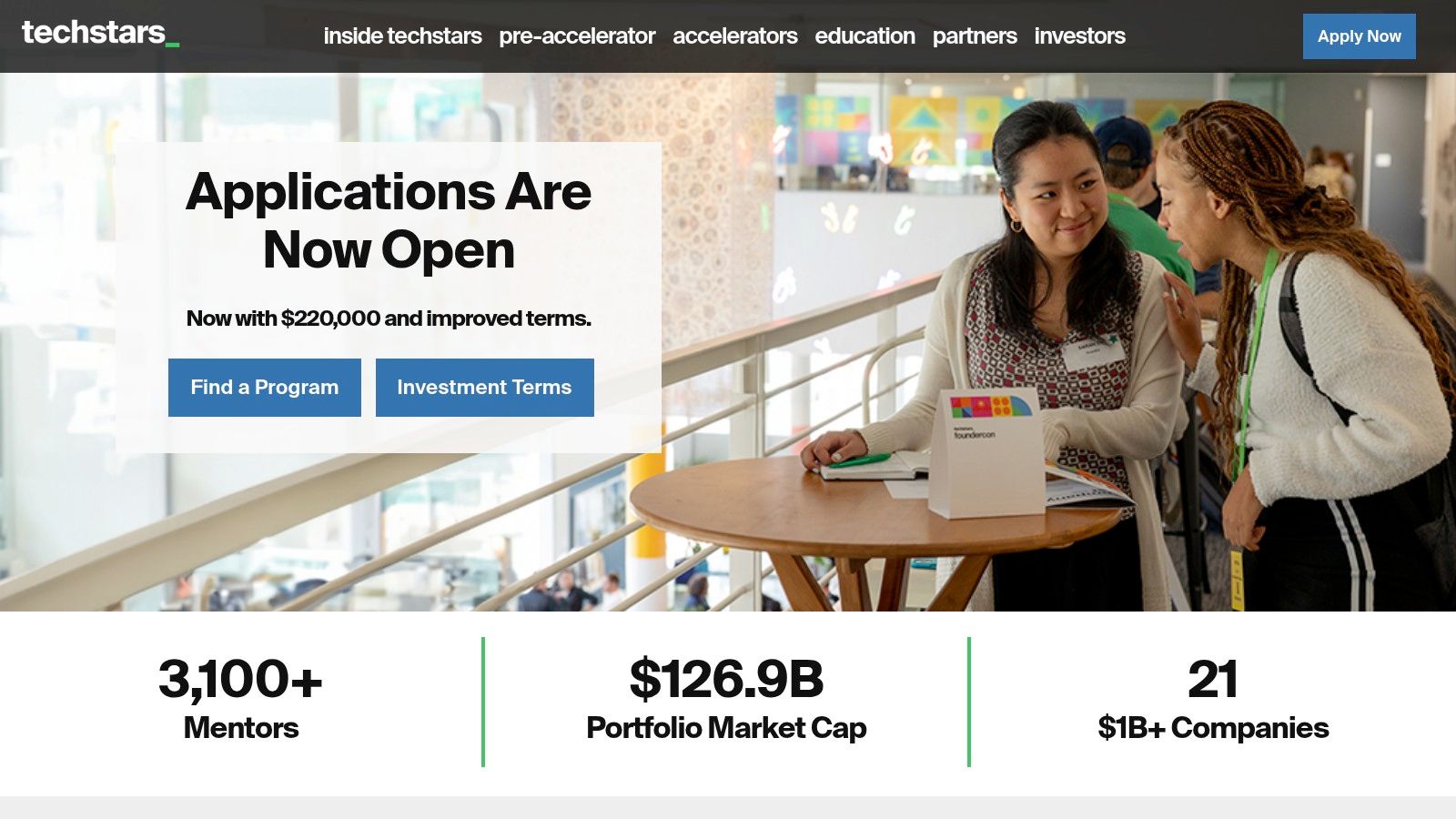
Techstars offers a $20,000 investment in exchange for 6% equity, along with the option of a $100,000 convertible note. The core of the program is its intensive three-month mentorship-driven curriculum, often referred to as "Mentor Madness." This provides access to hundreds of experienced mentors across various fields. The industry-specific nature of many Techstars programs, facilitated through partnerships with corporate sponsors, allows startups to connect with relevant experts and potential customers within their target market. Furthermore, the global reach of the Techstars network opens doors to international expansion opportunities. Beyond the program itself, Techstars offers lifetime access to resources and perks valued at over $1 million, providing ongoing support for alumni.
Features:
- $20,000 investment for 6% equity + $100,000 convertible note option
- Three-month program with intensive mentorship ("Mentor Madness")
- Industry-specific programs in partnership with corporate sponsors
- Global network spanning multiple cities and industries
- Lifetime access to Techstars resources and perks worth over $1M
Pros:
- Strong mentorship focus: Access to hundreds of mentors provides invaluable guidance and support.
- Geographic diversity: Programs across multiple continents cater to startups in various locations.
- Industry-specific programs: Targeted connections and resources within specific industries.
- Continued support: The Techstars network provides ongoing resources and connections post-graduation.
Cons:
- Higher equity stake: Compared to some other accelerators, Techstars takes a larger equity share.
- Program quality variance: The quality of the program can vary between different city locations.
- Fundraising leverage: While reputable, it may not carry the same fundraising prestige as Y Combinator.
- Mentor overload: Some founders report feeling overwhelmed by the sheer number of mentors.
For startups seeking deep mentorship, industry connections, and a global network, Techstars provides a compelling platform for growth. However, founders should carefully consider the equity stake and research specific program locations to ensure alignment with their needs. You can find more information and apply on their website: https://www.techstars.com/
3. 500 Global
500 Global, formerly known as 500 Startups, stands out as a leading accelerator for startups seeking rapid growth and a strong global presence. Founded in 2010, this venture capital firm has an impressive track record, having invested in over 2,500 companies across 77 countries. Their accelerator program isn't just about funding; it's a comprehensive platform offering mentorship, resources, and a robust network designed to propel early-stage startups toward success. This focus on growth marketing, design, fundraising, and investor network building makes it a strong contender for businesses looking for rapid scaling, especially on an international level. Its impressive alumni network, featuring companies like Credit Karma, Canva, Grab, and Talkdesk, further solidifies its position as a top accelerator.
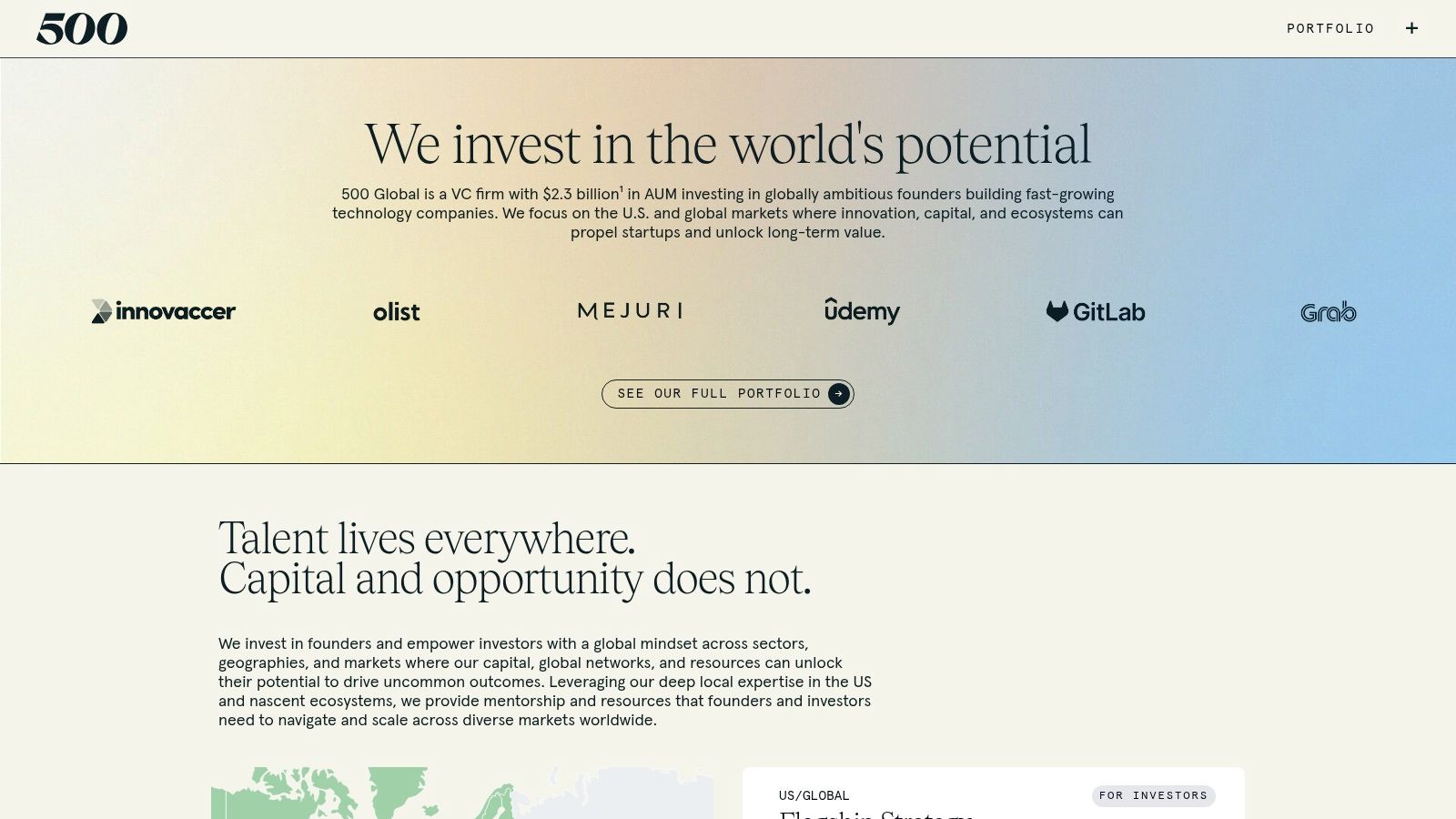
500 Global's four-month program provides a $150,000 investment in exchange for 6% equity. This program, with its emphasis on growth and distribution, goes beyond basic mentorship. Participants gain access to a global investor network spanning diverse geographies, opening doors to potential partnerships and funding opportunities worldwide. Furthermore, 500 Global offers specialized tracks for specific verticals like fintech and digital health, providing tailored guidance and resources relevant to these industries. Their hands-on growth marketing expertise and support are invaluable for startups looking to quickly acquire users and expand their market reach. For solo founders and entrepreneurs, particularly those with a global vision, this targeted expertise is crucial.
Features:
- $150,000 investment for 6% equity
- Four-month program with a focus on growth and distribution
- Access to a global investor network
- Specialized tracks for fintech, digital health, and other verticals
- Hands-on growth marketing expertise and support
- Flexible program with remote options available
Pros:
- Strong international focus with global connections: This is a significant advantage for startups targeting international markets.
- Exceptional marketing and growth expertise: 500 Global’s focus on growth marketing provides startups with the tools and strategies they need to scale rapidly.
- Flexible program with remote options available: This accessibility caters to a wider range of founders and teams.
- Large portfolio creates a valuable peer network: Connecting with other successful startups in the 500 Global network offers invaluable learning and collaboration opportunities.
Cons:
- Larger batch sizes can mean less individual attention: This is a common trade-off with larger accelerator programs.
- Less structured than some competing programs: Some startups may prefer a more rigid curriculum and schedule.
- Post-program support not as comprehensive as some competitors: Founders should be aware of the level of ongoing support offered after the four-month program.
- Higher equity stake than some accelerators: 6% equity is a significant consideration for founders, and should be weighed against the benefits offered.
Website: https://500.co/
For startups aiming for rapid, global growth and a strong emphasis on marketing, 500 Global is a compelling option. The program's focus on distribution, coupled with access to a vast international network, makes it a powerful accelerator for those ready to scale. However, founders should carefully consider the equity stake and the level of individual attention they might receive within the larger cohort. If your focus is on rapid user acquisition and expansion across geographical boundaries, 500 Global deserves serious consideration among the best accelerators for startups.
4. Plug and Play
Plug and Play distinguishes itself from traditional startup accelerators by prioritizing business development and corporate partnerships over direct investment. Founded in 2006, this global innovation platform acts as a bridge between promising startups and established corporations seeking cutting-edge solutions. Unlike many accelerators that take equity, Plug and Play's standard program doesn't require startups to give up a piece of their company in exchange for participation. Instead, they focus on facilitating introductions, pilot programs, and potential future investments through their separate venture fund. This makes it a compelling option for startups looking for rapid market validation and access to large enterprise clients. This approach makes them one of the best accelerators for startups seeking corporate collaborations.

With over 50 locations spanning five continents, Plug and Play offers industry-specific programs tailored to various sectors, including fintech, insurtech, health, mobility, and retail. This specialization allows startups to connect with relevant corporate partners and investors within their specific niche. Their three-month program concentrates on fostering business development, forging strategic partnerships, and securing pilot opportunities with their network of over 400 corporate partners. Notable alumni of Plug and Play include successful companies like PayPal, Dropbox, and Guardant Health, demonstrating the platform's potential to accelerate growth.
Features:
- No equity taken for standard program: While their venture fund may invest separately, participation in the core accelerator program doesn't require equity.
- Industry-specific programs with corporate partners: Tailored programs focused on connecting startups with relevant corporations in their respective industries.
- Three-month program duration: A concentrated program focused on achieving rapid business development and securing partnerships.
- Global presence: Access to a vast international network across North America, Europe, Asia, and beyond.
- Access to 400+ corporate partners: Opportunities for pilot programs and collaborations with leading enterprises.
Pros:
- Direct access to corporate partnerships and pilot opportunities: Plug and Play’s primary strength lies in its extensive corporate network.
- No equity requirement for standard program: Retaining full ownership is a significant advantage for many startups.
- Industry-specific tracks provide targeted connections: Focused programs streamline the process of connecting with relevant partners.
- Global innovation platform with international exposure: Expand your reach and gain valuable international experience.
Cons:
- Less focus on traditional investment connections: While their venture arm exists, the program itself prioritizes corporate connections over pure investment.
- Limited funding component compared to other accelerators: If funding is your primary goal, other accelerators might be a better fit.
- Less structured curriculum and mentorship: The program emphasizes facilitated connections over structured learning and mentorship.
- Value varies significantly depending on industry vertical: The effectiveness of the program can depend on the specific industry and the relevance of the corporate partners.
Website: https://www.plugandplaytechcenter.com/
For startups prioritizing corporate partnerships and rapid market access over immediate funding, Plug and Play offers a unique value proposition. Its industry-focused approach, global reach, and extensive network of corporate partners make it a strong contender for startups looking to scale through strategic collaborations. However, founders should carefully consider their funding needs and desired level of mentorship before applying, as the program's strengths lie primarily in business development and partnership facilitation.
5. AngelPad
For startups seeking highly personalized guidance and mentorship, AngelPad stands out as a top contender among the best accelerators for startups. Founded in 2010 by former Google executives, this program focuses on a small batch size, accepting only 10-15 companies twice a year for their intensive three-month program held in New York. This selective approach allows for deep engagement and tailored support for each participating startup. AngelPad's emphasis on company building, product strategy, and fundraising, combined with its curated Demo Day introductions to investors, provides a robust platform for launching and scaling a business. Their impressive track record, including successful alumni like Postmates, Pipedrive, and Buffer, and consistent top rankings by MIT's Seed Accelerator Rankings Project solidify its position as a powerhouse in the startup accelerator landscape.

AngelPad's program offers a $120,000 investment in exchange for 7% equity. This structured approach provides startups with essential seed funding while allowing them to retain a significant portion of their company. The intimate cohort size ensures each founder receives personalized attention from experienced mentors, fostering a collaborative and supportive environment. The curriculum is designed to refine core business elements, including product strategy, go-to-market planning, and fundraising techniques. The program culminates in a Demo Day, where startups present their refined pitches to a curated audience of investors, providing invaluable exposure and potential funding opportunities.
Features:
- $120,000 investment for 7% equity
- Small batch size (10-15 companies)
- Intensive three-month program
- Hands-on mentorship
- Focus on company building, product strategy, and fundraising
- Demo Day with curated investor introductions
Pros:
- Extremely hands-on mentorship due to small cohort size.
- High-quality mentorship from experienced operators.
- Strong emphasis on building sustainable businesses, not just rapid growth.
- Consistently highly rated by alumni for overall value and impact.
Cons:
- Extremely competitive with very low acceptance rates.
- Less name recognition than larger, more established accelerators like Y Combinator or Techstars.
- Smaller alumni network compared to larger programs, potentially limiting networking opportunities.
- Limited geographic presence (primarily New York).
Comparison with Similar Accelerators:
Compared to larger accelerators like Y Combinator or 500 Startups, AngelPad offers a more intimate and hands-on experience. While these larger programs benefit from extensive alumni networks and brand recognition, AngelPad's smaller size allows for deeper mentorship and individualized attention. For startups prioritizing personalized guidance over sheer network size, AngelPad presents a compelling option.
Implementation/Setup Tips:
Applying to AngelPad requires a compelling application that clearly articulates your business idea, market opportunity, and team's capabilities. Highlighting your unique value proposition and demonstrating traction, even at an early stage, can significantly strengthen your application. Researching AngelPad's alumni and understanding their investment focus can also help tailor your application to resonate with their selection criteria.
Website: https://angelpad.com/
In conclusion, AngelPad deserves its place on this list of best accelerators for startups due to its commitment to providing high-quality, hands-on mentorship and its impressive track record of success. For founders seeking a deeply immersive and personalized accelerator experience, AngelPad offers a powerful launchpad for building a thriving business.
6. Startup Bootcamp
Startup Bootcamp is a strong contender for startups seeking industry-specific acceleration, especially those with a B2B focus. Founded in 2010, it offers a global network of industry-focused accelerator programs across 100+ cities, providing a launchpad for startups in diverse sectors. This makes it a valuable resource for businesses looking for tailored support and connections within their specific niche. If you're looking for one of the best accelerators for startups with a global reach and industry specialization, Startup Bootcamp is worth considering.
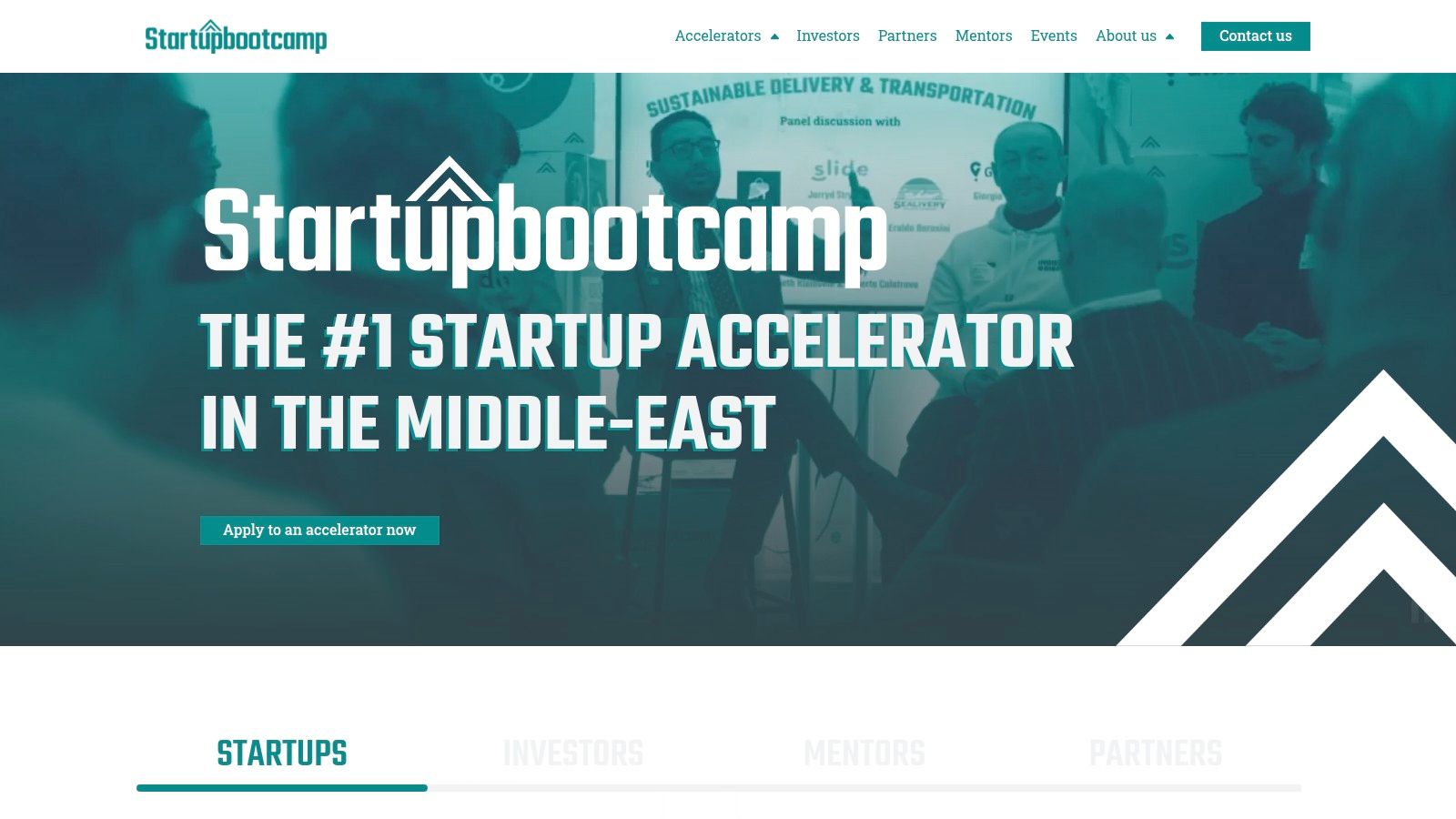
Their three-month program provides a structured environment for rapid growth, equipping startups with essential resources and guidance. Participants receive €15,000 (approximately $17,000) in funding in exchange for 6-8% equity. This investment, while smaller than some top US accelerators, is coupled with access to over 100 mentors per program, dedicated office space, and over €450,000 in partner deals and perks. The program's emphasis on securing pilot projects with corporate partners offers a significant advantage, particularly for B2B startups looking to gain traction and validate their product-market fit.
Startup Bootcamp differentiates itself through its industry-specific tracks. These specialized programs cater to sectors like fintech, insurtech, smart cities, digital health, and more, connecting startups with relevant corporate partners, mentors, and investors within their chosen field. This targeted approach allows for deeper engagement and facilitates access to niche resources that might be unavailable through generalist accelerator programs. For example, a fintech startup participating in the fintech-focused track can benefit from mentorship from seasoned financial professionals and potential partnerships with established financial institutions.
Features:
- €15,000 ($17,000) investment for 6-8% equity
- Three-month program with over 100+ mentors
- Industry-specific tracks with relevant corporate partners
- Global network spanning Europe, Asia, Americas, and MENA
- €450,000+ in partner deals and perks
Pros:
- Strong corporate connections for B2B startups
- Industry specialization provides targeted opportunities
- Global presence with programs on multiple continents
- Emphasis on securing real customer projects during the program
Cons:
- Smaller investment amount compared to top US accelerators
- Quality varies between different industry programs
- Higher equity percentage than some competitors
- Less powerful alumni network than top-tier US programs
Implementation/Setup Tips:
- Research the specific industry programs offered by Startup Bootcamp and choose the one that best aligns with your startup's sector and target market.
- Prepare a compelling application that highlights your startup's unique value proposition, market opportunity, and team expertise.
- Be prepared to actively engage with mentors and corporate partners during the program to maximize the benefits of the network and resources available.
Compared to accelerators like Y Combinator or Techstars, which offer larger investments and a more prestigious alumni network, Startup Bootcamp stands out through its industry focus and global reach. This makes it a compelling choice for startups seeking specialized support and connections within their niche, particularly outside the US market. For entrepreneurs seeking to enter specific verticals and leverage a global network, Startup Bootcamp offers a unique pathway to accelerated growth. You can find more information on their website: https://www.startupbootcamp.org/
7. MassChallenge
For startups seeking rapid growth without relinquishing equity, MassChallenge stands out as a leading accelerator. Founded in 2009, this non-profit organization offers a unique model: zero equity taken in exchange for participation. Instead, they fuel growth through equity-free cash awards, mentorship, and invaluable connections to corporate partners. This makes it a compelling option for founders prioritizing control and minimizing dilution, placing it firmly among the best accelerators for startups.
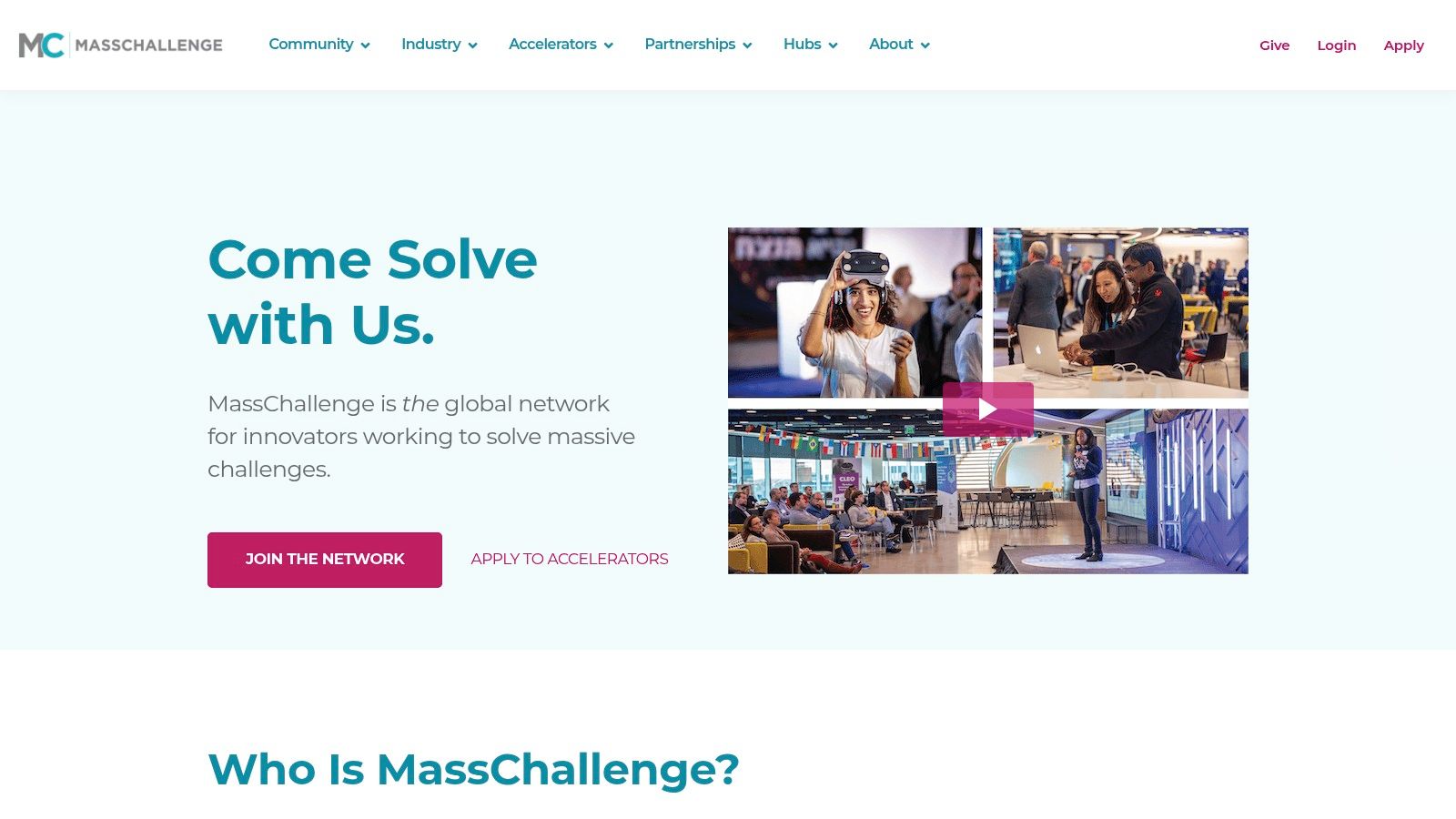
MassChallenge's four-month program provides startups with co-working space, access to industry-specific mentors (healthtech, fintech, etc.), and a structured curriculum designed to accelerate their trajectory. The culmination of the program involves a pitch competition where top-performing startups can win a share of equity-free cash prizes, totaling up to $1 million per program. This competitive element not only provides a significant financial boost but also validates the startups' potential in the eyes of potential investors and partners.
Unlike equity-based accelerators that prioritize financial returns for their investors, MassChallenge’s non-profit structure allows them to focus solely on founder success. This translates into a supportive environment where mentors and partners are genuinely invested in the startups' growth, not just their potential exit value. With locations in Boston, Israel, Mexico, Rhode Island, Switzerland, and Texas, MassChallenge offers a global network, fostering international expansion opportunities for participating startups.
Features:
- Zero equity taken from startups
- Equity-free cash prizes totaling up to $1M per program
- Access to corporate partners and specialized mentors
- Four-month program with co-working space
- Industry-specific tracks (healthtech, fintech, etc.)
Pros:
- No equity dilution for founders
- Strong non-profit mission focusing on founder success
- Competitive cash prizes for top performers
- Global network with multiple international locations
Cons:
- Less financial incentive for the accelerator to support long-term success (compared to equity-based models). This means post-program support might be less intensive.
- Larger batch sizes can mean less individual attention from mentors and staff.
- Fewer direct investor connections than equity-based programs, requiring startups to be more proactive in fundraising.
- Less selective than some top-tier accelerators, resulting in a wider range of startup maturity levels within each cohort.
Website: https://masschallenge.org/
Implementation/Setup Tips:
- Thoroughly research the specific MassChallenge program location and industry track that best aligns with your startup's needs.
- Prepare a compelling application highlighting your startup's unique value proposition, market opportunity, and team's capabilities. Focus on demonstrating how your startup aligns with MassChallenge’s mission and how you plan to leverage their resources.
- Be prepared to actively network and engage with the MassChallenge community, including mentors, corporate partners, and fellow startups. This is crucial for maximizing the program's benefits.
MassChallenge presents a powerful alternative to traditional equity-based accelerators, particularly for bootstrapped startups or those prioritizing founder control. While it might require more proactive fundraising efforts, the combination of equity-free funding, mentorship, and corporate connections makes it a valuable resource for startups looking to scale rapidly while retaining ownership. If you’re searching for the best accelerators for startups and equity retention is a primary concern, MassChallenge deserves serious consideration.
8. Founders Factory
Founders Factory stands out among the best accelerators for startups due to its unique hybrid model. Combining both acceleration and incubation, Founders Factory offers two distinct paths for startups. Their accelerator program supports later-stage startups ready to scale, while their venture studio builds entirely new companies from the ground up. This dual approach makes them a compelling option for entrepreneurs at various stages of their journey. They focus on specific industry verticals, including fintech, healthcare, retail, media, and beauty, partnering with established corporations in each sector.
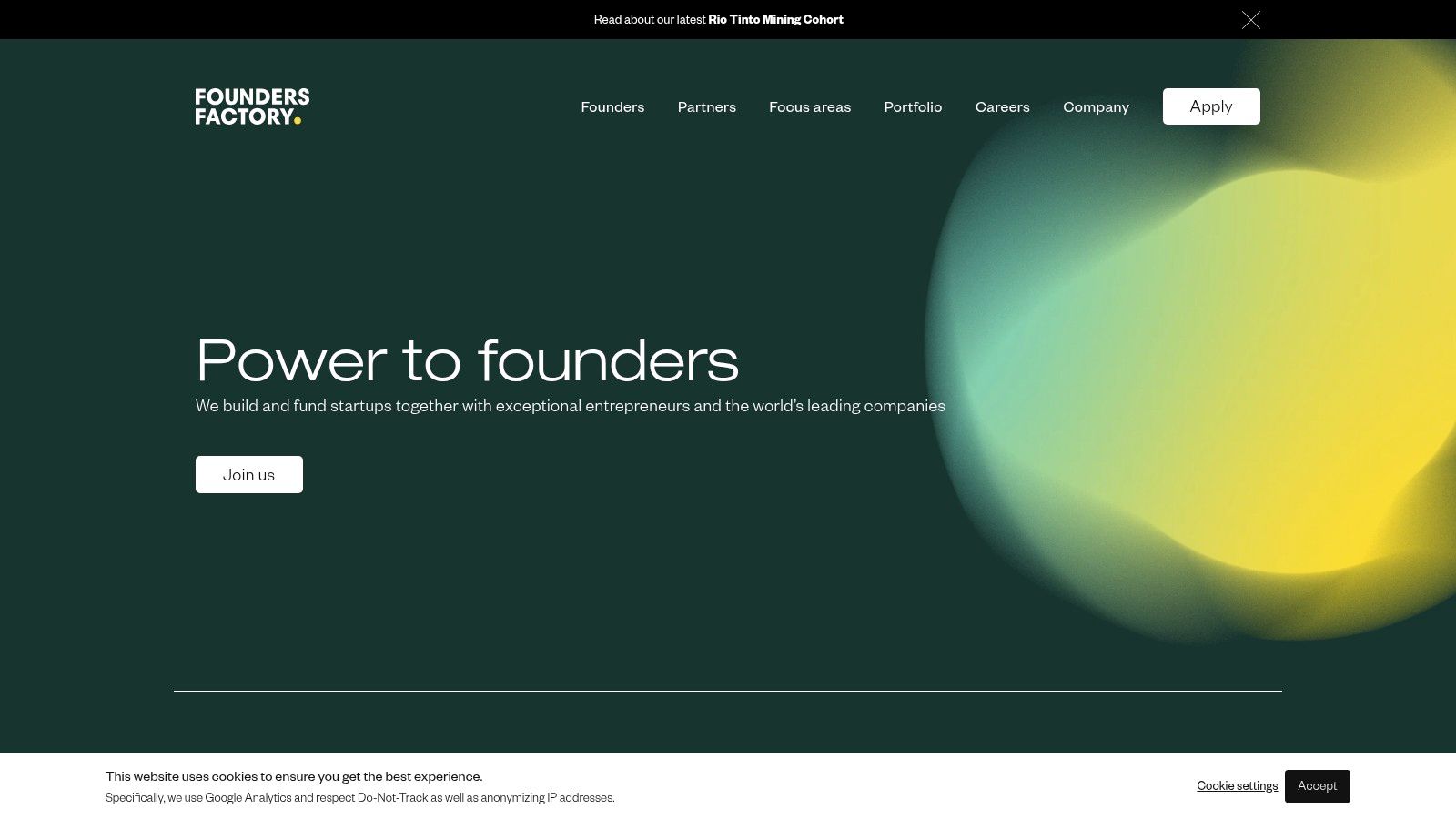
For startups accepted into the accelerator program, Founders Factory provides a six-month intensive program, injecting £30,000 in funding for 4-7% equity. This program goes beyond mentorship; their 60+ person operating team offers hands-on support across various business functions. This operational expertise is a key differentiator, providing startups with the practical skills and resources needed to navigate the challenges of growth. This contrasts with some other accelerators that primarily focus on mentorship and networking. Furthermore, Founders Factory's strong corporate partnerships offer invaluable opportunities for pilot projects, contracts, and potential customer acquisition, offering a significant advantage in a competitive market. For example, a fintech startup in the program might gain access to a major bank for pilot testing, providing real-world validation and a powerful case study.
Founders Factory’s sector-specific approach allows them to tailor the program to the unique needs of each startup. This targeted support can be particularly beneficial for startups tackling complex industries like healthcare or fintech, where regulatory hurdles and industry-specific knowledge are crucial. While the program offers significant advantages, it's important to consider the potential drawbacks. The selective nature of the program and industry focus might make it unsuitable for some startups. Additionally, while they have global ambitions, their primary focus remains on the UK and Europe. Compared to more established accelerators like Y Combinator or Techstars, Founders Factory has a shorter track record. Finally, the strong corporate influence might not be ideal for every startup, especially those seeking a more independent path.
Key Features:
- Investment: £30,000 for 4-7% equity (accelerator program)
- Program Length: Six months
- Support: Hands-on operational support, sector-specific expertise, corporate partnerships, access to a 60+ person operating team
- Follow-on Funding: Opportunities through Founders Factory Ventures
Pros:
- Hands-on operational support from experienced team members
- Strong corporate partnerships leading to commercial opportunities
- Potential for pilots and contracts with industry leaders
- Tailored program for specific needs
Cons:
- Selective and focused on specific verticals
- Primarily UK/Europe focused
- Less established track record
- More corporate-oriented
Website: https://foundersfactory.com/
For entrepreneurs seeking deep operational support, industry connections, and the potential for rapid growth within a structured environment, Founders Factory presents a compelling option among the best accelerators for startups. However, founders should carefully consider their industry, stage of development, and comfort level with a corporate-influenced environment before applying.
Top 8 Startup Accelerators Comparison
| Accelerator |
Core Offer & Investment 💰 |
User Experience & Mentorship ★★★★☆ |
Target Audience 👥 |
Unique Selling Points ✨ |
Price & Equity 💰 |
| Y Combinator |
$500K seed, intense 3-month program |
High-touch, expert advice, Demo Day exposure |
Ambitious early-stage startups |
Prestigious network & investor access 🏆 |
$125K for 7% + $375K SAFE |
| Techstars |
$20K + $100K note, 3 months mentorship |
Broad mentor pool, diverse cities & industries |
Industry-specific startups globally |
Corporate partners & lifetime perks ✨ |
$20K for 6% + $100K note |
| 500 Global |
$150K investment, 4 months focused on growth |
Growth marketing focus, remote options |
Early-stage startups seeking marketing help |
Global reach, fintech/digital health tracks ✨ |
$150K for 6% |
| Plug and Play |
No equity, 3 months business development |
Less structured, focus on corporate deals |
Startups needing corporate partnerships |
No equity taken, 400+ corporate partners 🏆 |
No equity in standard program |
| AngelPad |
$120K seed, small batch, 3 months intensive |
Very hands-on, strong product & fundraising focus |
Selective early-stage founders |
Small cohorts, personalized mentorship ✨ |
$120K for 7% |
| Startup Bootcamp |
€15K (~$17K), 3 months with 100+ mentors |
Industry-specific, strong B2B corporate access |
Industry vertical startups globally |
Pilot projects & €450K+ perks ✨ |
€15K for 6-8% |
| MassChallenge |
Zero equity, 4 months with cash awards |
Large cohorts, less investor focus |
Diverse startups avoiding dilution |
Equity-free cash prizes, non-profit model 🏆 |
No equity, cash prizes up to $1M |
| Founders Factory |
£30K (~$36K), 6 months hands-on support |
Operationally intensive, sector-tailored |
Later-stage, corporate-backed startups |
Corporate pilots & follow-on funding ✨ |
£30K for 4-7% |
Fueling Your Startup's Future
Choosing the best accelerator for startups can be a game-changer. From the renowned Y Combinator and Techstars to specialized programs like 500 Global and niche offerings like AngelPad, Startup Bootcamp, MassChallenge, Plug and Play, and Founders Factory, each provides a unique set of advantages. The key takeaway is to carefully consider your specific needs. Do you require industry-specific mentorship? Are you looking for substantial funding? Is a large alumni network a priority? These factors will heavily influence which of the best accelerators for startups is the right fit for you.
Implementing your chosen accelerator program effectively involves strategic planning. Consider your stage of development, team composition, and long-term vision. Remember, the application process itself can be a valuable learning experience, providing insights into your business model and highlighting areas for improvement. Finding the right fit among the best accelerators for startups maximizes your chances of success in the competitive landscape of 2025 and beyond.
A strong team is crucial for navigating the challenges of a startup and is often a key factor for acceptance into top accelerators. Need a co-founder to bolster your application and bring complementary skills to your venture? IndieMerger connects entrepreneurs, making it easier to find the perfect co-founder to share your vision and strengthen your startup's foundation. Explore IndieMerger today and find the ideal partner to help you get into the best accelerators for startups: IndieMerger